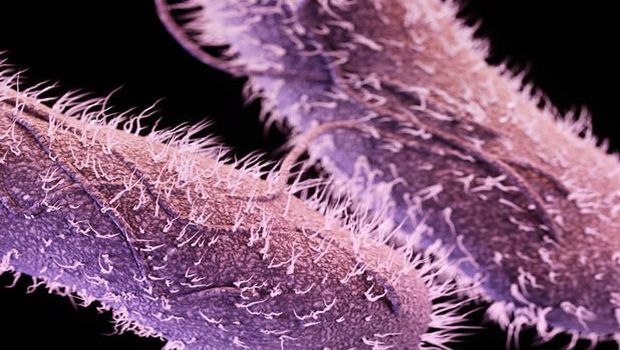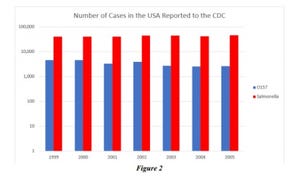Petition seeks FSIS action on salmonella
Salmonella outbreaks now more common than E.coli outbreaks, consumer groups claim.

Consumers groups filed a petition requesting that the U.S. Department of Agriculture's Food Safety & Inspection Service (FSIS) take additional action regarding salmonella strains from meat. The petition seeks expedited action to issue a new interpretive rule that declares salmonella bacteria as “adulterants” in order to increase monitoring efforts to better ensure the safety of the general public.
Salmonellosis is responsible for approximately 26,500 hospitalizations and 420 deaths in the U.S. each year, the petition stated. Foodborne salmonellosis triggers approximately 130 outbreaks in the U.S. each year. Despite significant efforts to prevent salmonella infections, rates of the foodborne disease are not declining. In fact, the number of infections has substantially grown since 2015.
The petition wants FSIS to take this action through interpretive rule-making on 31 outbreak serotypes jointly or on each serotype individually, as it has a demonstrable history associated with either an illness outbreak or a product recall and is proved to be injurious to human health.
Such an action furthers the goals of the Federal Meat Inspection Act (FMIA) and the Poultry Products Inspection Act (PPIA) to protect the health and welfare of consumers by encouraging the meat and poultry industry to engage in more effective oversight measures and create and implement effective preventive measures. These same motives prompted a previous court to find interpretive rule-making the proper avenue for USDA to deem another harmful pathogen, Escherichia coli O157:H7, as an adulterant under FMIA, the petition noted.

In the wake of a major outbreak of E. coli O157:H7 illnesses, FSIS announced in 1994 that it would henceforth interpret FMIA to declare E. coli O157:H7 an adulterant. A few years later, the present petitioners requested that FSIS declare all enterohemorrhagic Shiga toxin-producing E. coli (STEC) serotypes to be adulterants within the meaning of FMIA. FSIS announced that it would do just that in 2012, officially declaring six additional strains of E. coli — O26, O45, O103, O111, O121 and O145 — to be adulterants. The 2012 declaration was based on the six strains’ demonstrated threat to human health and to the U.S. food supply, as well as the fact that “illnesses due to E. coli serogroups other than O157:H7 … outnumber[ed] those attributed to O157:H7."
The petition explained, “The effect of these declarations is unmistakable. Although it took time to implement the necessary changes and methodology ensuring compliance with FSIS’s new declaration, these heightened standards caused a predictable initial spike in reporting numbers, followed by a sharp decline in both recall events and reported illnesses (Figure 1) as, presumably, the industry reacted positively to the heightened safety requirements. Meanwhile, reports of salmonellosis — which had been consistently higher than the reported numbers of both O157:H7 and STEC generally — remained static during the same time.”
In response, Food & Water Action senior government affairs representative Tony Corbo said, “It’s hard to believe, but our ask is simple: We just want to make sure that when someone buys ‘USDA certified’ beef or chicken, they will not contract salmonella. … Right now, the USDA stamp means next to nothing. This new rule would protect public health, which should be FSIS’s bottom line.”
Petitioners include Marler Clark LLP PS, on behalf of Rick Schiller, Steven Romes, the Porter Family, Food & Water Watch, Consumer Federation of America and Consumer Reports.
Schiller, from San Jose, Cal., developed reactive arthritis and colonic diverticulitis after becoming infected by Salmonella Heidelberg during the 2013 Foster Farms poultry outbreak. He was one of 634 reported victims of the outbreak. Romes, from Gilbert, Ariz., was one of the 400 reported victims of the 2018 JBS Tolleson beef outbreak whose Salmonella Newport infection led to a chronic illness, irritable bowel syndrome. Rose and Roger Porter Jr. are from Rainier, Wash. In 2015, Rose, Roger and their daughter Mikayla (who was 10 years old at the time) fell severely ill with Salmonella I 4,[5],12:i:- poisoning after consuming pork produced by Kapowsin Meats. They were three of the 192 reported victims of the outbreak.
About the Author(s)
You May Also Like





